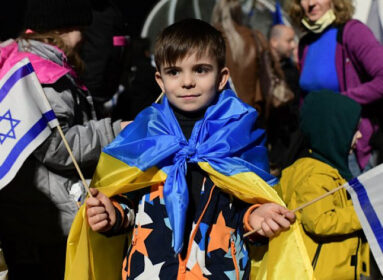 Should Jews celebrate Valentine’s Day?
Should Jews celebrate Valentine’s Day?
By Judie Jacobson
No, Valentine’s Day was not created by Hallmark and assorted candy companies for the sole purpose of selling cards and sweets. The roughly one billion cards sold in conjunction with the holiday just make it seem that way. (Fun fact: 85 percent of those cards are bought by women.)
So, where do the roots of the worldwide day of love lie? Good question. While the genesis of the Feb. 14 celebration is somewhat murky, it appears that Pope Gelasius declared Feb. 14 as St. Valentine’s Day around 498 A.D., in honor of one of three saints named Valentine or Valentius.
According to History.com, stories about St. Valentine are based more on legend than historical fact – and there is no shortage of legends where Valentine is concerned. One such popular legend is that Valentine actually sent the first “valentine” greeting himself. While in prison, it is believed he fell in love with a young girl — who may have been his jailor’s daughter — who visited him during his confinement. Before his death, he is believed to have written her a letter, which he signed “From your Valentine.” Hence the expression that is commonly associated with the holiday today.
Valentine’s Day continued to gain in popularity through the 17th and 18th centuries. It was in the 1840s that Valentine’s Day cards began to be produced.
Of course, today, most people are unaware of the origin of Valentine’s Day. Even the Catholic Church questions the holiday’s Christian roots: In 1969, as part of the landmark set of reforms adopted by the Catholic Church – Vatican II, the Catholic Church went so far as to remove Valentine’s Day from its calendar of feasts.
With this in mind the question arises as to whether it is appropriate for Jews today to celebrate Valentine’s Day.
Writing on MyJewishLearning.com, Rabbi Mike Uram, director of the Jewish Renaissance Project and Associate Director of the University of Pennsylvania Hillel, points out that “a number of halakhic rulings have been written in response to questions of whether or not Jewish law allows for the celebration of holidays such as Valentine’s Day. The most relevant is from the Rama (Rabbi Moshe Isserlis, Poland, 1520-1572) who explains that there are four criteria that must be met in order to permit Jewish celebration of rituals initiated by Gentiles:
1. Are the origins of the rituals secular?
2. Can the ritual be explained rationally separately from the gentile holiday?
3. If there were idolatrous origins to the holiday, have they disappeared?
4. Are the rituals consistent with Jewish tradition?
“In the case of Valentine’s Day, one may certainly argue that the rituals performed today do meet these criteria,” says Uram. Sending cards and chocolates and giving gifts can be explained as rational expressions of love and appreciation independent of possible Christian roots. … Finally, the desire to express love and to offer gifts as a symbol of those feeling is certainly in line with Jewish tradition and values. The idea of a special day set aside to encourage coupledom is also well rooted in the Jewish tradition: Tu B’Av, the 15th day of the Jewish month of Av, was an ancient day of matchmaking that has experienced something of a revival in modern times.”
We asked Connecticut rabbis to weigh in on the subject. Here’s what they had to say:
Temple Sholom of Greater Greenwich
Greenwich
(Conservative)
I grew up with ambivalence towards Valentine’s Day. My mother refused to let my father celebrate the “holiday” telling him it wasn’t “Jewish”. However, in my elementary school where I was the only male Jewish student in my grade and there was only one Jewish girl, my mother insisted that I participate in the annual ritual of giving Valentine’s cards to my classmates. When I objected, she declared, “This is what American kids do!”
I was lucky to find and marry my college sweetheart. The ambivalence towards Valentine’s Day continued for us both. Our celebration was low key, usually with a little gift or dinner out when we were young. However, in 1997 our youngest son was born on February 14th and Valentine’s Day completely disappeared for us. I never gave it much thought until a couple of years ago when I was leading a temple mission in Israel during February and I saw the widespread marketing of Valentine’s Day or “Love Day”. I was a bit surprised, but quickly realized how it made sense that Israelis would want to fit in to the larger cultural pattern of many non-Jews. What an easy match – the universalistic value of LOVE shared and a boon for the Israeli flower industry.
Today’s celebration of Valentine’s Day matches up with the real Jewish Love Day which falls on Tu B’Av. Is it so terrible to “Judacize” a holiday of pagan origin and make it kosher? After all, we did this with a lot of other pagan customs over the last few millennia. If Jews want to celebrate “love”, I’m all for it. The Hebrew numerical value for AHAVA (Love) is 13. By Jewish tradition, the number 13 is considered among the holiest because the value is equated with God. God is traditionally understood as having 13 primary attributes. And while God is “one” (echad), the Hebrew numerical value of echad is 13. In other words, Judaism invented the placard “God is Love”. If it is good enough for God, it is good enough for me.
Beth David Synagogue
West Hartford
(Orthodox)
Judaism is a faith steeped in history; in fact, a limited familiarity with history might be considered a prerequisite for the knowledgeable fulfillment of some of our faith-based rituals and mitzvot. Unfortunately, that virtue of knowing the past is not a prerequisite for knowing how to navigate in the present. Additionally, many of our non-Jewish neighbors are not sufficiently versed in the history of holidays that have become secularized that even for them, the spiritual origins are no longer clear or compelling. Halloween (originally All Hallows Eve) is about celebrating the season of fall, right? Valentine’s Day (technically Saint Valentine’s Day) is about celebrating relationships, right?
Discouraging the current social practices associated with these days is viewed almost as anathema to the goal of living in America as Americans. Yet, I remember one Halloween from the days when I was a student in elementary school, attending a Jewish day school right here in Connecticut. I came home that afternoon with an unusually large amount of homework. I was frustrated and sad that I would miss out on trick-or-treating with my friends because I would be home doing arithmetic and penmanship until well after dinner time. My mother, a World War II refugee from Germany and proud to be an American, was not about to have me miss the evening in costume with my friends. She called the school principal at his home and complained. He explained that he was not familiar with the daily homework assignments of each class and grade; yet, he was sure that there would be enough time for everything if I worried less and worked quicker. A few minutes later, the teacher called and encouraged my mother to help me finish the assignments. We do not want your son to miss out on something he might enjoy, he said, but we do want him to be a Jew before he is anything else.
Temple Beth Hillel
South Windsor
(Reform)
My thoughts stem from the rabbinic dictum, “dina de malchuta dina,” “the law of the king is law.” Essentially, this means that if a standard practice doesn’t directly undermine Jewish law, it is not only acceptable, but encouraged.
There is nothing here that directly undermines Jewish law. I encourage all to find romance every day of the year. However, if you don’t find it on the 14th of February, you might have a difficult 15th.
Beth El Temple
West Hartford
(Conservative)
The approach of Valentine’s Day creates a fascinating question: What to do with an “in-between day” that is not nearly as tied to Christianity as are Christmas and Easter nor as intimately expressive of Jewish values as is Thanksgiving.
In our home, we haven’t observed the “in-between days” Valentine’s Day and Halloween. The reason is not theological.
It is true that both days have their origins with Christian saints or, in the case of Halloween, overt pagan practices, as well. But nobody thinks of those beginnings any more than they ponder the Masonic origin of the pyramid on the dollar bill. The commercializing of these days has totally altered their nature.
Instead, we choose to emphasize specifically Jewish ways of experiencing fun and loving ties.
The counterpart to Halloween is, of course, the soon approaching day of Purim. Here is Halloween with a twist: dress up in costumes, collect treats but this time give them away to others along with some charitable money for those in need. Not a bad message in consumption oriented America.
As for Valentine’s Day, who needs a day on the calendar to tell a beloved that they mean the world to them? For a bit of additional insurance that this might regularly happen, Shabbat ritual enshrined the sharing of loving words each Friday night. Passages singing the praises of one’s beloved from the book of Proverbs and Psalms are sung. Children are blessed with a biblical phrase. Personal words, hugs and kisses abound.
I don’t find the “in-between days” as heretical in any traditional sense of the term. Yet it is striking how they invite some enriching Jewish alternatives
Jews in the heart of Valentine’s Day
By Edmon J. Rodman/JNS.org
Is the heart of Valentine’s Day thumping to a Jewish beat?
Yes, I know that February 14th’s murky origins lie in a third-century martyred priest named Valentine, and that Jews already have a lesser-known day of love, Tu B’Av, that is celebrated each summer.
But that doesn’t mean all Jews have been left out of the run-up to red day. In fact, we’re creators and purveyors of part of the day’s pop culture—some of the flowers, candies, and even card designs that are popular on Valentine’s Day have a Jewish connection.
Not that we spent earlier times denying our feelings of love. In the Bible, “The Song of Songs,” Shir HaShirim, can be read as erotically charged, complete with seductive kisses, sensual fragrances and the longings of love. In medieval Spain, hundreds of years before the Rolling Stones performed “Let’s Spend the Night Together,” Sephardic Jews were writing Ladino love songs like “The Rosa Enflorece” (“The Rose Blooms”).
In 1937, the Jewish songwriting team of Richard Rodgers and Lorenz Hart wrote for their Broadway musical, “Babes in Arms,” the only song about Valentine’s Day to become famous, “My Funny Valentine.”
In the 1970s, Jewish designer Milton Glaser created perhaps the most influential heart design ever—the “I ♥ New York” logo.
Sweetening the day, especially for observant Jews, is the candy business, with many chocolate companies such as Godiva, See’s, and Fannie May offering kosher Valentine’s Day options. A company called Oh! Nuts even offers heart shaped kosher jelly “I Love You” lollipops. http://www.ohnuts.com /buy.cfm/handmade-i-love-you-heart-jelly-pops-24ct-box
Israel’s flower business has also blossomed for Valentine’s Day—with Israeli flower growers selling red varieties of anemone, buttercups, gerbera, and lilies for the holiday in Europe, Asia, and the U.S. In 2013, Israel’s Flower Growers Association had said it expected the country to export some 60 million roses, orchids, Bonsai trees, and other flowers on Valentine’s Day.
For those who believe that love (or is it Valentine’s Day?) can make strange bedfellows, another Israeli company, the Flower Council, has become the biggest exporter of flowers grown by Palestinians in the West Bank and Gaza Strip, in addition to handling Israeli flower exports, according to Haaretz.
To end the day with a romantic gesture, or more, in New York, there’s a “Kosher Sex Toys” website—http://koshersextoys.net/index.php?route=common/home—created to help “happily married couples enhance their intimate moments.” That is, enhancement without “crude or indecent pictures or text.” Though I discovered while checking out some of the “toys” that they might give you a Valentine’s Day rush—or blush, anyway.
Young Jewish adults are looking at Valentine’s Day as a way to draw in participants. Since the holiday falls on a Friday night this year, the Franklin & Marshall College Hillel in Lancaster, Penn., is sponsoring an “(Anti) Valentine’s Day Shabbat Dinner.”
In Los Angeles, a progressive synagogue, Beth Chayim Chadashim, is organizing a “Valentine’s Day: Jewish LGBT Speed Dating” event for Feb. 15. “Meet one-on-one with a bunch of other singles to see who you click with and want to see again for a second date!” reads the blurb on their website.
Nudging the holiday even more into line with Jewish life—particularly the mitzvah of tzedakah—the Charles and Lynn Shusterman Family Foundation (http://www.schusterman.org/blog/clsff/happy-generosity-day), a nonprofit “rooted in Jewish values,” is offering a heart-shaped image for download. Noting that people “are rebooting Valentine’s Day as Generosity Day,” the foundation made available a Valentine’s Day card with this message:
“Roses are Red
Violets are Blue
This Valentine’s Day
I made a donation to:
__________________
In honor of you.”
Of course, come Valentine’s Day, you could still deny any Jewish association with the occasion—correctly noting that it’s just not on the Jewish calendar. You could. But as you explain that to your significant other, the day could turn red anyway.
Edmon J. Rodman writes on Jewish life from Los Angeles.








 Southern New England Jewish Ledger
Southern New England Jewish Ledger













